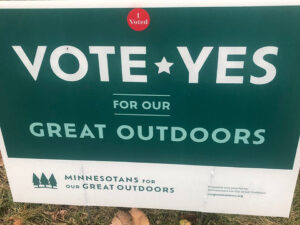Minnesota voters approve environmental funding as Freshwater sets priorities for 2025 legislative session
 It’s been a week since the election, and here at Freshwater, we’ve been having lots of conversations with colleagues, friends and family to talk about what the results might mean for water – here in Minnesota and for our planet.
It’s been a week since the election, and here at Freshwater, we’ve been having lots of conversations with colleagues, friends and family to talk about what the results might mean for water – here in Minnesota and for our planet.
While there is no shortage of speculation about how the new administration and Congress may approach various environmental policy issues, one thing remains clear: Water is something we all share, and it can transcend political, social, economic and cultural divides.
As we look forward to the coming months, here are a few points to consider:
1) The vast majority of Minnesota voters care about the environment. Our state’s ballot question on whether to renew the Environment and Natural Resources Trust Fund with dedicated funding from the Minnesota Lottery passed with 77 percent of voters approving this initiative. Over the past 36 years, this fund has delivered more than $1 billion to environmental projects that support clean water, wildlife and outdoor recreation. This overwhelming success is just one example of how much all Minnesotans care about preserving our lands and waters, regardless of who they voted for at the top of the ticket.
2) Water is not a partisan issue. Our Freshwater policy team is busy preparing for the Minnesota state legislative session, which begins January 14, 2025. You can find our legislative agenda on the Policy page of our website. Over the past two months, we have met with leadership from each Minnesota state agency. And between now and January, we plan to meet with Minnesota House and Senate members from both parties to discuss water policy solutions grounded in science.
3) Solving water challenges requires action. A common phrase we heard during last year’s state legislative session was, “We all want clean water, but…” The truth is that achieving clean, sustainable water for all people will require compromise. It will require collaboration far beyond what we currently see among government agencies, businesses and citizens. It will require prioritization of time, energy and money. Quite simply, it will require action – and each of us has an important role to play.
To be sure, there will be challenges ahead regarding climate policy, federal agency structure and funding, protection of public lands and waters, and any number of national environmental issues. At the state level, control of the Minnesota House of Representatives is likelyto be split 50/50 for the first time since 1979, which brings with it uncertainty and a rare opportunity for cooperation between political parties.
Also, let’s not forget that many important water decisions are made at the local level. So, if you haven’t previously attended a city council or watershed district meeting, weighed in on a county planning or zoning discussion, voted for a soil and water conservation district supervisor, or contacted your local representatives to respectfully voice your concerns about water – now is a great time to start.